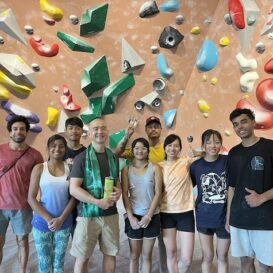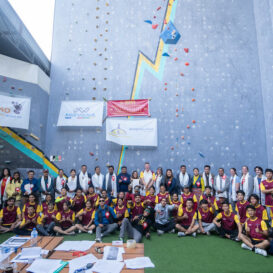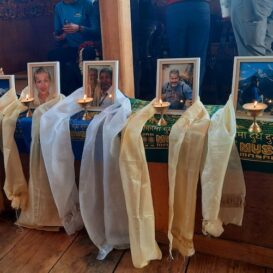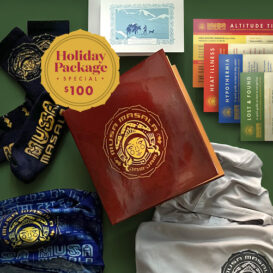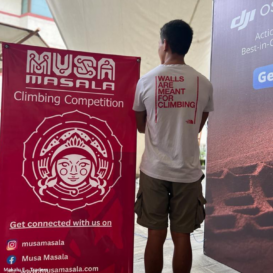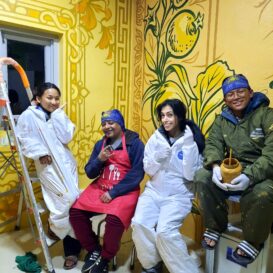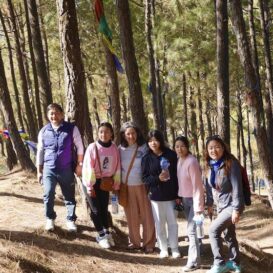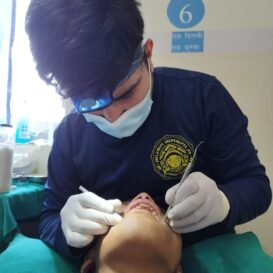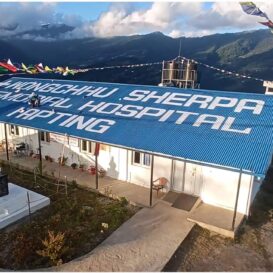The first week of August was epic in the development of the Wongchu Sherpa Memorial Hospital—a joint project between Everest ER, Himalayan Rescue Association and Wilderness Medicine Society. Over 530 medical professionals ascended to Telluride, Colorado for a conference on Wilderness Medicine. Throughout the week, these professionals collaborated on medicine in austere environments: tactical medicine, travel medicine, altitude medicine and much more. It was a week of learning and networking, hiking and enjoying the beauty that is Telluride.

Ang Phula Sherpa arrived in Telluride after much anticipation to present the development of the Wongchu Sherpa Memorial Hospital and to ask for donations for the hospital. He noted $2million is necessary to build the hospital and to begin staffing the hospital, which has raised about $150,000 thus far.
Musa Masala made her first appearance in front of the Wilderness Medical Society as well. Her voice was provided by Tatiana Havryliuk, who encouraged the audience to visit musamasala.com to learn more about Nepal and where the hospital will be built.
Ang Phula and Luanne Freer spoke about Wongchu Sherpa, his life and his legacy. There was much emotion present in the room as they remembered Wongchu in his hospital bed, unwilling to let go until he knew this hospital would be built in the near future.
The movie “Everest” then played as the audience watched Ang Phula star as Pemdorji Sherpa in a representation of the tragic 1996 expedition.
This week was a grand adventure, raising over $6,000 for the hospital and spreading the word to gather funds for this boundless project to benefit the people of the Chyangba Village and the lower Khumbu region, Nepal.

After the showing of Everest and fundraiser for Wongchu Sherpa Trust
Left to right: Dr. Luanne Freer, Sarah Frances McClure, Ang Phula Sherpa, Dr. Tatiana Havryliuk
Luanne Freer, MD spoke about losing Wongchu Sherpa:
“We lost him from the earth in December of 2015. He was a terrific friend, and not only a personal friend of mine for years, but was such a philanthropist and doer of good in the country of Nepal that it was hard not to meet him and fall in love with him. I very quickly realized he was going to be one of my best friends and supporters running the Everest ER…but really wanted to share him with the rest of my friends… His fan club grew…he was illiterate, did not attend school even through the 5th grade…
Despite these shortcomings and coming from a very destitute village and poor family, this man created one of the most successful trekking agencies in Nepal, became a high altitude climber of great repute, lead people on expeditions – like Sting and Michael Palin. He made several world renowned documentary series. He was the Sirdar or head guide of the IMAX 1996 expedition and a dear friend of David Breashears who was a producer on this Everest film. In fact, Wongchu was involved in the making of the Everest film we are about to see…
As we sat with Wongchu in the last year of his life, we said, ‘What is left undone? What are you not letting go?’ He starved himself down to about 62 pounds. It was painful to watch. He said, ‘I can’t let go yet. My village doesn’t have healthcare.’ He had brought a road in. He had brought hydroelectric power to the village of poor people who were wrecked in the 2015 earthquake. He wasn’t done yet. I remember sitting by his bed in November saying, ‘Wongchu, you can go. We got this. We will do this for you.'”

Paul Auerbach, MD remembers Wonchu Sherpa and his remedy to a altitude headache during a trek to Pikey Peak:
“I knew I had mountain sickness. It was dark. It was late. I stumbled out of my tent in my skivvies. Within 15 seconds there was a flashlight in my face. It was Wongchu. He said, ‘Dr. Paul, what’s the matter why are you dressed like this?’ I said, ‘I have a terrible headache. I have mountain sickness.’ He said, ‘I know what you need.’ Now no matter what you had at anytime lemon tea was always one of the medications. So he said, ‘You need lemon tea and I’m going to make you feel better.’ So he took his hands and he started to squeeze my head as hard as he could. He said, ‘Are you feeling better?’ I said, ‘No, Wongchu, you’re killing me. Where’s that oxygen bottle?’ He brought me some oxygen and I took some dexamethasone…woke up the next morning feeling human enough. He never left my side for a second. Took me up Pikey Peak…He cared so much more about others than he did about himself. We all miss him horribly…this is a way for all of us to give back to Wongchu.'”
— Sarah Frances McClure, WCUCOM, OMS – IV

